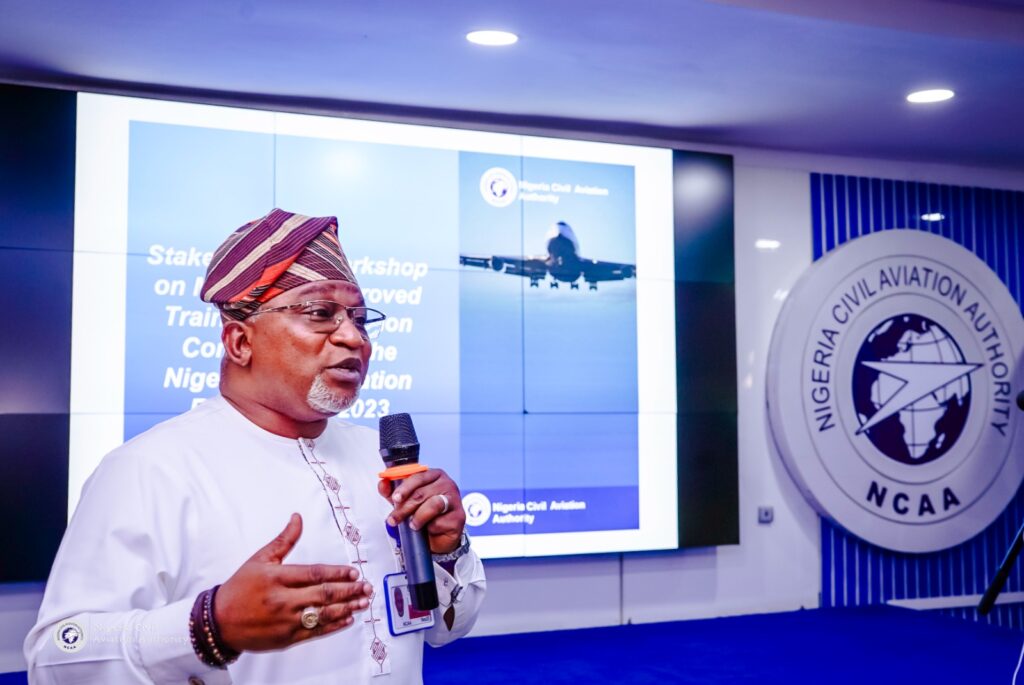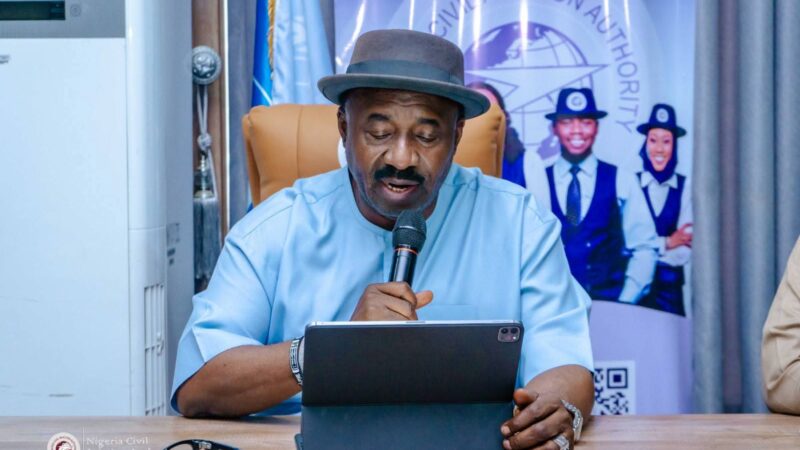Benchmarking Regulatory Compliance in Nigeria’s Aviation Sector: The Role of ATOs

…Stakeholders Unite to Uphold Stringent Standards in Aviation Training
In Nigeria’s evolving aviation landscape, the role of Approved Training Organisations (ATOs) in producing highly skilled aviation professionals cannot be overstated.
These institutions are responsible for training pilots, engineers, air traffic controllers, cabin crew, and other critical personnel who uphold the industry’s safety and efficiency.
However, as the sector continues to grow in complexity, strict adherence to regulatory standards set by the Nigerian Civil Aviation Authority (NCAA) and global bodies like the International Civil Aviation Organization (ICAO) has become an indispensable requirement.
At a recent stakeholders’ workshop titled Managing Approved Organisations’ Compliance With the Nigeria Civil Aviation Regulations (Nig. CARs), the Director-General of the NCAA, Captain Chris Najomo, underscored the necessity for ATOs to maintain strict compliance with aviation regulations to safeguard safety, professionalism, and Nigeria’s global aviation reputation.
“These organisations are the foundation upon which we build well-trained professionals who ensure the safety and efficiency of our aviation operations,” Najomo stated. “Today, we face significant challenges in maintaining high standards of quality and compliance within our training organisations. Rapid advancements in technology, evolving regulatory frameworks, and the increasing complexity of aviation operations necessitate a proactive and collaborative approach.”
Najomo, who was represented by NCAA’s General Manager of Licensing, Mr Hyelni Bassi, emphasised that the workshop provided an avenue for stakeholders to exchange insights, explore best practices, and enhance transparency and accountability in training programmes.
The Nigerian Civil Aviation Regulations (Nig. CARs), in alignment with ICAO standards, require all ATOs to meet stringent operational and training standards before being granted approval to operate.
These regulations mandate:
The employment of certified and qualified instructors with industry-recognised accreditations.
The implementation of approved syllabi and curricula that align with international best practices.
Adequate infrastructure, including flight simulators, classrooms, and maintenance facilities.
Standardised assessment processes to ensure trainees meet competency thresholds.
The establishment of robust Safety Management Systems (SMS) to mitigate risks during training.
Despite these mandates, the NCAA has identified instances where some training organisations fail to meet the required standards, leading to concerns about the quality of graduates they produce and the broader implications for Nigeria’s aviation sector.
Adoyi Sunnie, Head of the ATO Inspectorate at the NCAA, highlighted that many applications submitted for ATO approval fail to meet regulatory requirements. “As the Civil Aviation Authority (CAA) and as applicants, we have a responsibility to do what is right.
Applicants must comply with regulations, ensuring they have adequate facilities and a conducive working environment appropriate for the tasks to be performed,” Sunnie stated.
He outlined key compliance requirements, including the need for sufficient technical data, equipment, training devices, and materials necessary for conducting approved courses.
Other requirements include competent management and instructional personnel, well-defined policies and procedures, an effective Quality and Safety Management System.
Sunnie assured stakeholders that while the NCAA remains firm on regulatory compliance, the Authority is leveraging technology to streamline approval processes without compromising standards.
Risks of Non-Compliance
Failure to comply with NCAA regulations carries significant risks for both training institutions and the aviation sector at large.
Some of the most pressing consequences include:
Safety Hazards
Aviation is a high-risk industry where precision and proficiency are paramount. Poorly trained personnel increase the likelihood of operational errors, which can lead to incidents or accidents.
Inadequate pilot training, for instance, may result in incorrect decision-making during critical flight operations, endangering passengers and crew.
Reputational Damage
Nigeria’s aviation industry operates in a globalised environment, where training standards are closely scrutinised.
Any lapses in compliance could tarnish the country’s reputation, making it difficult for Nigerian-trained personnel to secure employment with international airlines and aviation firms.
Economic Implications
Investors and international aviation stakeholders prioritise regulatory compliance when considering business opportunities in Nigeria.
A poorly regulated training environment could deter investments and limit the growth potential of the country’s aviation industry.
To address these challenges, stakeholders must adopt a proactive and collaborative approach to strengthening compliance across aviation training institutions.
Key measures include:
Intensified Oversight by NCAA
The NCAA must enhance its oversight functions by conducting frequent audits of ATOs to ensure they adhere to prescribed standards.
Institutions found lacking should be given corrective timelines, with strict enforcement measures for non-compliance.
Training institutions must prioritise the professional development of their instructors.
Periodic recertification and upskilling initiatives should be mandatory to ensure trainers remain knowledgeable about evolving industry practices.
Enhanced Industry Collaboration
ATOs should work closely with airlines and regulatory bodies to align training programmes with industry needs.
Knowledge-sharing initiatives, exchange programmes, and partnerships with globally recognised aviation training institutions could help elevate Nigeria’s training standards.
Adoption of Tech Innovations
Integrating cutting-edge technologies such as flight simulators, virtual reality (VR), and artificial intelligence (AI) into training curricula will enhance learning outcomes and ensure trainees receive practical, high-fidelity simulations before engaging in real-world operations.
Beyond theoretical knowledge, aviation training should emphasise practical exposure, critical thinking, and crisis management.
Scenario-based learning methodologies should be incorporated to prepare trainees for the complexities of modern aviation.
With increasing global competition and the rapid evolution of aviation technologies, maintaining regulatory compliance is no longer optional – it is an absolute necessity.
The NCAA, in collaboration with ATOs and industry stakeholders, must remain steadfast in enforcing high training standards to position Nigeria as a leader in aviation training across Africa.
By fostering a culture of compliance, innovation, and excellence, Nigeria can build an aviation workforce that is not only competent but also highly respected globally.







